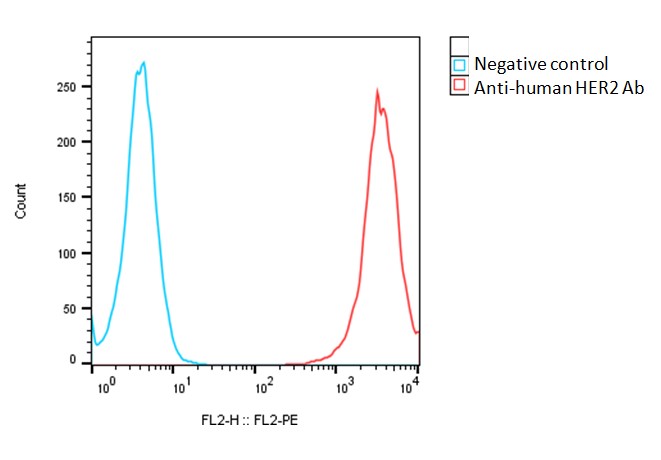
| Catalog Number | Product | Size | Price | |
|---|---|---|---|---|
| C3064 | Cynomolgus HER2-CHO-K1 Stable Cell Line | 2 vials | $5950 | Order |
| Catalog Number | C3064 |
|---|---|
| Cell Line Name | Cynomolgus HER2-CHO-K1 Stable Cell Line |
| Accession Number | XP_005584091.2 |
| Host Cell | Adherent CHO-K1 |
| Quantity | Two vials of frozen cells (2x106 per vial) |
| Culture Medium | DMEM with 10% FBS, 4 µg/ml puromycin |
| Freezing Medium | 90% FBS and 10% DMSO |
| Storage | Liquid nitrogen upon receipt |
| Product Datasheet: | Download PDF |
Detection of cyno HER2 expression on cyno HER2-CHO-K1 stable cells using a monoclonal antibody specific for human HER2 (Accurus, Cat. #A1019), followed by staining with PE-anti human antibody.

HER2 (human epidermal growth factor receptor 2 or ErbB2) is a protein receptor encoded by the HER2/neu gene and member of the epidermal growth factor receptor (EGFR) family. HER2 regulates cell growth and division by activating signaling pathways involved in cell proliferation, survival, and differentiation. Activation leads to downstream signaling cascades, including the PI3K/AKT and MAPK/ERK pathways, promoting cell growth and survival and angiogenesis. HER2 is expressed in various tissues, including the epithelial cells of the breast, ovary, lung, and gastrointestinal tract. Normal levels of HER2 expression are crucial for the regulation of cell growth and maintenance of tissue homeostasis but overexpression or amplification of HER2 can occur in certain cancers, notably breast cancer and gastric cancer leading to aggressive tumor growth and poor prognosis. The overexpression of HER2 in cancer cells make it an attractive therapeutic target resulting in the revolutionized treatment of HER2-positive breast cancer. Drugs such as trastuzumab (Herceptin), pertuzumab (Perjeta), and ado-trastuzumab emtansine (Kadcyla) specifically target HER2 and have shown significant clinical benefits, improving overall survival and progression-free survival in patients with HER2-positive breast cancer leading to improved clinical outcomes.
Slamon DJ, Clark GM, Wong SG, et al. Human breast cancer: correlation of relapse and survival with amplification of the HER-2/neu oncogene. Science. 235(4785):177-182. 1987.
Moasser MM. The oncogene HER2: its signaling and transforming functions and its role in human cancer pathogenesis. Oncogene. 26(45):6469-6487. 2007.
Baselga J, Swain SM. Novel anticancer targets: revisiting ERBB2 and discovering ERBB3. Nat Rev Cancer. 9(7):463-475. 2009.